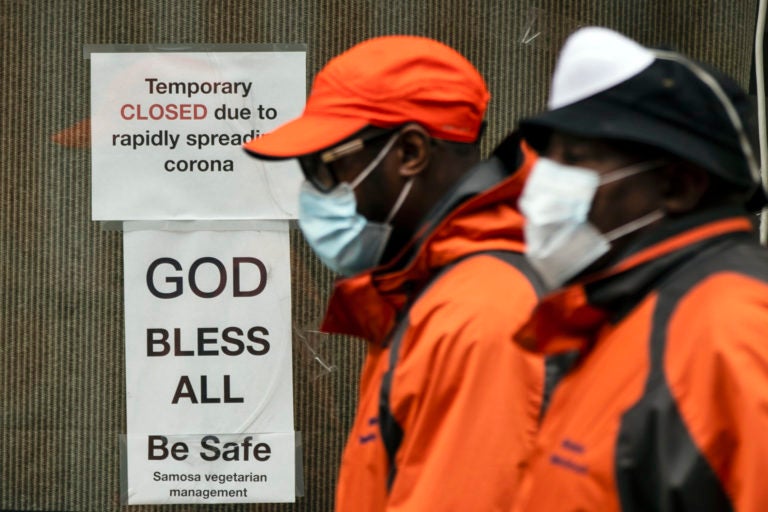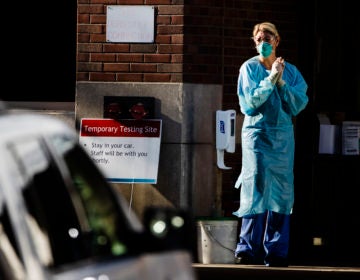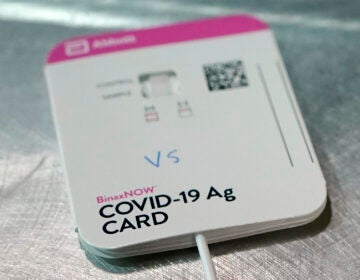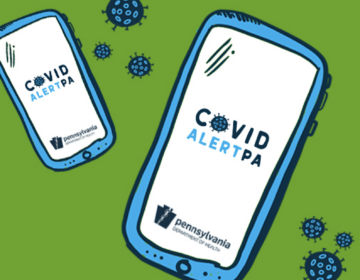Gov. Wolf updates list of ‘life sustaining’ businesses; Montco asks for mask donations
The masks being sought by Montgomery County would go toward first responders and hospitals as needed.

Pedestrians in protective face mask walk past a closed business in Philadelphia, Friday, March 20, 2020. (Matt Rourke/AP Photo)
Updated 6:18 p.m.
Pennsylvania Governor Tom Wolf has updated the list of life sustaining businesses that can keep physical locations open. Businesses that are now deemed life sustaining after being left off the list yesterday include: forestry, mining, converted paper product manufacturing, insurance, accounting and bookkeeping, specialty food, hotel, and laundry services (more on that from WHYY’s Katie Meyer.)
Beer, wine, and liquor stores have been taken off the list of life-sustaining businesses, with an exception for beer distributors.
To date, there are 293 confirmed COVID-19 cases in Pennsylvania, 890 in New Jersey, and 39 cases in Delaware.
Montgomery County gets testing site, asks for mask donations
Valerie Arkoosh, chair of the Montgomery County Board of Commissioners, announced 13 new cases within the county, to reach a total of 68, including one four-year-old girl who is in the hospital. Arkoosh noted that the county is now getting testing data from commercial labs as well, so will not always know if the people are at home or in a hospital. She added that 407 people have tested negative for coronavirus as of March 19.
Arkoosh put out a call to for businesses that have access to any type of masks to donate to the county. She said, for instance, if there are landscaping businesses that have masks, or businesses that use masks before applying certain cleaning products, they would be welcomed by the county. She said the masks would go toward first responders and hospitals as needed. She asked potential donors to call the county’s COVID-19 information hotline at 610-631-3000.
Starting tomorrow, Montgomery County will have a COVID-19 testing site at Temple University’s Ambler Campus in Upper Dublin Township, available only to county residents by appointment online. Online registration starts at 5 p.m. today here, and the site will be open from 10 a.m. to 6 p.m. everyday starting tomorrow. People who do not have a computer or internet access can register by calling the county’s COVID-19 hotline. Arkoosh said there is a limited number of tests, so only people who meet one or more of these criteria will get tested:
- Fever at or above 100.4 degrees Fahrenheit and respiratory symptoms such as cough or shortness of breath;
- Temperature at or above 99.6 degrees Fahrenheit and 65 years of age or older;
- First responder (law enforcement, fire, EMS, or dispatcher) and concern for exposure to a patient with suspected COVID-19 OR respiratory symptoms;
- Health care worker providing direct patient care, testing not available through employer, concern for exposure to a patient with suspected COVID-19, or respiratory symptoms
Arkoosh said people who get tested should get results in 4-6 days. She said this site is set up with the federal government, so the county does not have full control over how results come back.
Only people in cars, small vans and trucks can enter. Pedestrians, large commercial vehicles and motorcycles are not allowed.
Commissioner Joseph Gale said Montgomery County is working with municipalities to extend the deadline for property tax payments, both to help residents and reduce the need for them to visit tax collectors. Gale recommended that municipalities extend the property tax discount period by at least four weeks, but preferably until May 31.
Pa. sees ‘exponential growth’ in new cases
State Health Secretary Rachel Levine said that in two weeks the number of counties with COVID-19 cases has increased from two to 26. On Wednesday, there were 37 new cases, but on Friday there were 83.
“So in just two days, we have doubled the amount of new cases,” Levine said. “The exponential growth of new cases, and the new counties where they are being detected, shows the need for the aggressive steps that the governor has taken.”
Levine added that according to a Centers for Disease Control and Prevention analysis, 20% of the people in the United States with COVID-19 who were hospitalized are between ages of 20 and 44.
“We are seriously concerned that individuals in the 20-44 age range are not heeding the message to stay home and are creating an unnecessary risk to themselves and to others,” Levine said. “This could lead to a significant impact on our health care system.”
Roughly 80% of hospital beds in the state are filled now, and the department is working with hospitals, health systems, and the Pennsylvania Emergency Management Agency to see how many more are needed, Levine said. That’s why the governor has called for people to not have elective medical procedures at this time, so there are enough hospital beds, she said.
Gov. Tom Wolf said he decided to close all businesses that are not “life-sustaining” following advice from Levine and guidelines from the U.S. Department of Homeland Security. He said that local officials should enforce those rules, and that the state will use the state police.
When asked about whether the state would delay the April 28 primary election, Wolf said his administration is working with the legislature on that and expects to decide shortly. He noted the State House will be back in session next week and the State Senate is meeting remotely.
“These are uncharted waters, and in this situation we’re not going to do everything perfectly, but we’re going to do the best we can to help prevent our hospital system from crashing, as we’ve seen in other countries, Wolf said.
Philadelphia now has a total of 67 confirmed COVID-19 cases
City Health Commissioner Thomas Farley provided a breakdown of those cases by age on Friday:
- Under age 20: 1
- Ages 20 – 39 : 37
- Ages 40 – 59: 18
- Age 60 or above: 11
Of those cases, eight have been hospitalized. Farley corrected an error he made Thursday and clarified that 10, not 20, of the cases are health care workers.
The numbers show that while COVID-19 is more severe for older people, it can be severe for young people as well. Farley said the increase is partly because of more tests, but mostly because of the virus spreading in the city.
“We expect that increase to continue; we are clearly in the rapid growth phase of this epidemic.”
He said the city knows of 20 testing sites in the greater Philadelphia area that served around 1,000 people Thursday. He said most large health care providers have set up testing sites, but that the providers have asked the city not to post a full list of those locations because otherwise people would just walk up and ask for tests. People should call their medical providers first for a clinical evaluation, he said.
Farley noted that all sites have a problem with a shortage of kits, so they will have criteria for who can and cannot get tested.
The new testing site in South Philly is open only to people in cars. When asked about people who don’t have cars, Farley said most of the other sites are open to people walking up to get tested, and that the South Philly site followed a drive-through testing layout from the federal government. He added that the city is looking into making it accessible to people who want to walk up to get tested as well.
What is ‘life-sustaining’?
Philadelphia’s managing director, Brian Abernathy, said the city does not agree completely with what Pennsylvania Gov. Tom Wolf considers to be “life-sustaining businesses.”
For example, Abernathy noted that construction sites might need time to shut down and there is a hospital being built (more on construction from PlanPhilly); it might be important for electronics stores to stay open in case people need cell phones or appliances like refrigerators fixed; medical workers who bike to work might need bike repair shops to stay open. He noted the state has a waiver policy for businesses that think they should be put on the list of essential businesses.
Rev. Naomi Washington-Leapheart, the city’s director for faith-based and interfaith affairs, strongly urged congregations to have remote and virtual services.
Changes to where students can get free meals in Philadelphia
Starting Monday, March 23, Philadelphia Parks and Recreation sites will no longer give out free student meals. The remaining 80 locations — at Philadelphia public schools, charter schools, and Philadelphia Housing Authority community centers — will be open from 9 a.m. till noon.
The city has put up a list and map of all the sites here. Families can get six meals per student — 3 breakfasts and 3 lunches.
The Philadelphia School District sites that give out free meals will also have K-12 learning guides.
Pump prices plummet
Pennsylvania’s average price for gas is now $2.39 per gallon, New Jersey’s is $2.31, Delaware’s is $2.08. The national average stands at $2.17.
Gasoline prices have been trending downward since the start of the year, but that trend has accelerated since the spread of coronavirus. AAA Mid-Atlantic’s Ken Grant says the combination of plummeting demand for gas around the world, combined with a price war between Russia and Saudi Arabia, has pushed the cost for crude oil even lower.
He added that “the impact of COVID-19 and the oil price wars may significantly diminish the typical run-up in gas prices we see through the spring.”
Crude oil prices have fallen below $30 per barrel, the lowest it’s been in more than two decades. The price of crude closed at $26.43 per barrel on Thursday.
Northeast Pa. congressman in self-quarantine
U.S. Rep. Matt Cartwright, a Democrat whose district encompasses several counties in northeastern Pennsylvania, tweeted that he interacted with someone who tested positive for COVID-19, so he is self-quarantining at home for the next two weeks.
In a statement, Cartwright said he has not developed any symptoms.
WHYY is your source for fact-based, in-depth journalism and information. As a nonprofit organization, we rely on financial support from readers like you. Please give today.





![CoronavirusPandemic_1024x512[1]](https://whyy.org/wp-content/uploads/2020/03/CoronavirusPandemic_1024x5121-300x150.jpg)


